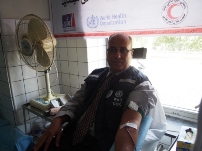 WHO's Health Cluster Coordinator Dr Abou Zeid donating blood at the World Blood Donor Day event in KabulKabul 14 June 2015 – Afghanistan’s Ministry of Public Health and WHO marked World Blood Donor Day today to raise awareness about the need for availability and appropriate use of safe blood. To meet the growing needs for blood and blood products, more people must come forward to donate blood voluntarily and regularly. People most in need of blood transfusions include children under five years of age, women suffering from severe bleeding during delivery or after childbirth and people who have suffered injuries as a result of conflict and road accidents.
WHO's Health Cluster Coordinator Dr Abou Zeid donating blood at the World Blood Donor Day event in KabulKabul 14 June 2015 – Afghanistan’s Ministry of Public Health and WHO marked World Blood Donor Day today to raise awareness about the need for availability and appropriate use of safe blood. To meet the growing needs for blood and blood products, more people must come forward to donate blood voluntarily and regularly. People most in need of blood transfusions include children under five years of age, women suffering from severe bleeding during delivery or after childbirth and people who have suffered injuries as a result of conflict and road accidents.
“Many Afghans rely on the generosity of others to donate blood and currently we need more volunteer blood donors,” says Minister of Public Health H.E. Dr Ferozuddin Feroz. “Blood donations are crucial especially for reducing maternal mortality in Afghanistan. Severe bleeding during delivery or after childbirth is a major cause of maternal mortality and long-term disability. When there is severe bleeding, urgent and timely treatment is required for management of these patients, including transfusion of blood and blood products, as women may die within one hour.”
Afghanistan currently has over 27 000 registered, regular unpaid blood donors of which 96% are men. Out of all blood donors, around 47% are voluntary donors and 53% are family donors. The safe transfusion of blood and blood products help patients suffering from life-threatening conditions live longer and with higher quality of life. In addition to supporting complex medical and surgical procedures, blood transfusion plays an essential, life-saving role in maternal and child care and during man-made and natural disasters.
“Blood donation saves lives and we encourage everyone to donate blood freely and often. An adequate supply of safe blood can only be assured through regular donations by voluntary unpaid blood donors,” says Dr Richard Peeperkorn, WHO Country Representative. “WHO remains committed to supporting safe blood donation in Afghanistan through training health care providers on blood transfusion and blood bank management, supporting the blood transfusion service surveillance system, equipping blood banks and developing national guidelines and standards for blood transfusion. We continue to strengthen service delivery and safety to improve access to safe blood and blood products for patients in need.”
The amount of blood donated in Afghanistan over the past decade has increased over 100%; however, more voluntary donors are needed to meet the growing demand for blood transfusion. Donating blood is easy, quick and safe: people can donate blood in all district, provincial and regional hospitals around Afghanistan.








